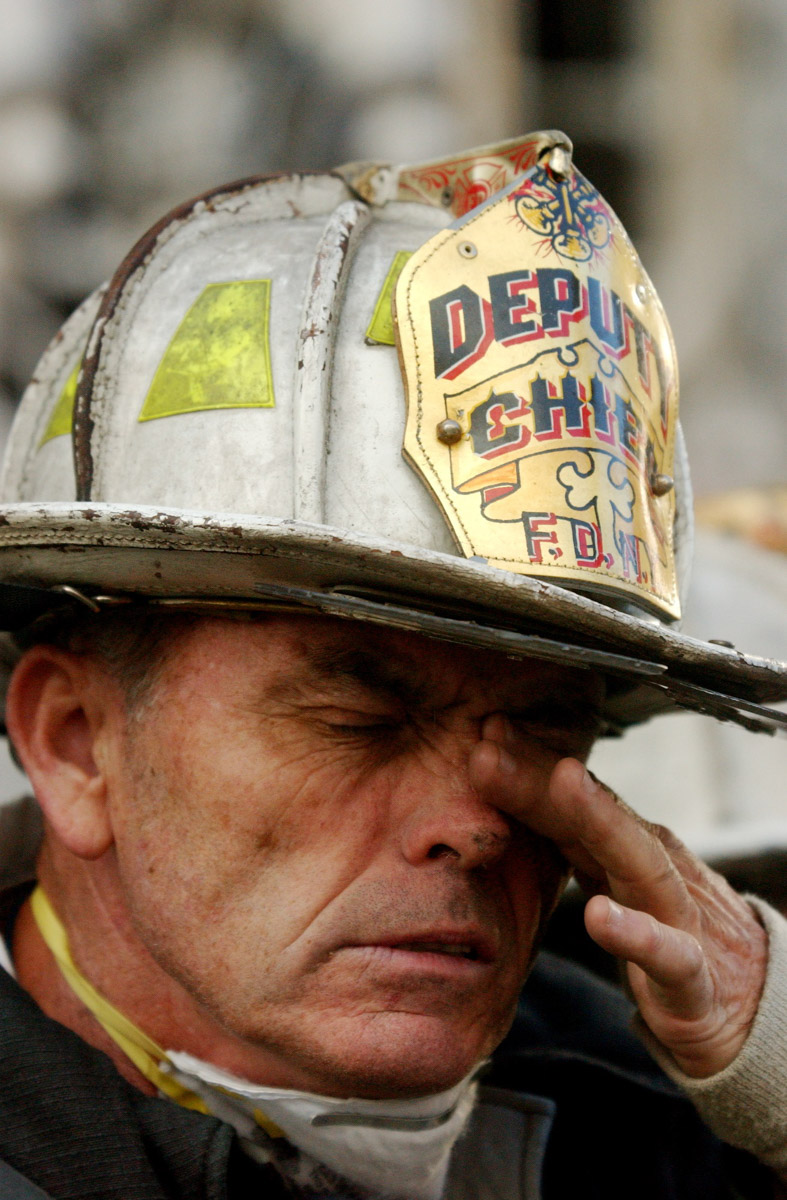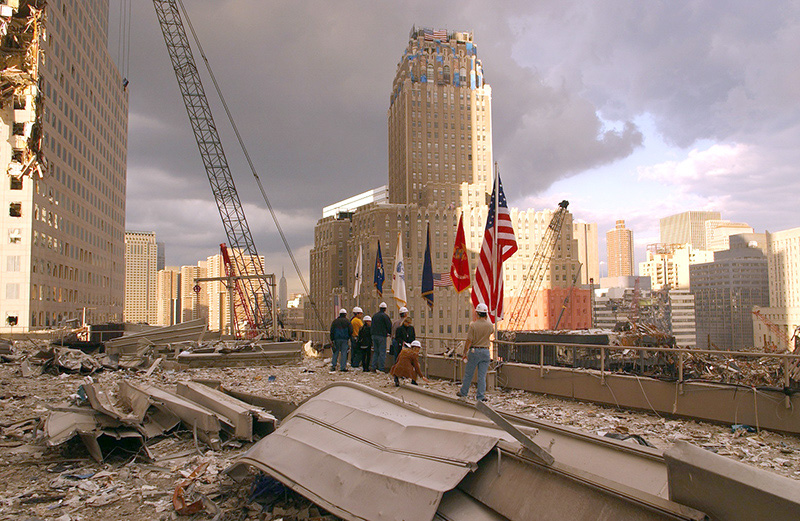Commemorating September 11th
As we commemorate the 20th Anniversary of September 11th, the Museum & Library wanted to take a moment to reflect on its impact on a more personal level while also providing a few resources for those interested in learning more about the tragic events that took place that day in 2001.
Every generation experiences a defining moment. Some remember where they were the exact moment President Kennedy had been shot. Some recall the Challenger Disaster with vivid detail. For most of us, the events of September 11, 2001, hold that same distinction.
The events that took place on September 11th changed the lives of millions, re-shaped the world and continue to have a lingering impact to this day. To highlight and explore its impact in greater detail, we asked some of our staff and board to share their experience and explain their reaction to the events that took place 20 years ago…
 Bridget D. Altenburg, Board Member
Bridget D. Altenburg, Board Member
I was attending grad school in NYC during the attacks of 9/11 and my father was inside the Pentagon. My first thought was to put on my old uniform and walk 100 blocks to the site to see if I could help. I walked past hospitals waiting for victims who were never found as well as long lines of people waiting to give blood. The whole day we waited for word that Dad was okay. Finally, we got an email from an unknown sender “it’s Dad, I’m ok.” My neighborhood lost every single firefighter that day. They had rushed to the south tower, the first to fall. Flowers piled up in front of fire houses on the upper west side. That day defined us in many ways. Some were called to serve in the military. Others served their communities in other ways. Even today 20 years later, people tell me they were called to serve because of 9/11.
James Brundage, Museum Curator
I was a junior in high school when the terrorist attacks of 9/11 occurred. At roughly a quarter to nine, when the first plane hit the World Trade Center, I found myself in art class. The radio station we were listening to was interrupted by a special news announcement and Katie Couric said the world trade center had been hit by a plane. It was while we were listening live that the second plane hit the second tower. At that point everyone seemed to recognize that these were serious events. The school day continued as normal; however, I do recall returning home and immediately turning on the TV, spending the rest of the day (and the following weeks) watching the coverage of the events. I never felt endangered on the day itself, but because of the seriousness of everything, I knew that the world was going to change dramatically as a result.
Teri Embrey, Director of Library Services
I’ll never forget the morning of 9/11. I had just gotten off the train and walked to my office on Michigan Avenue when I heard the devastating news that the planes had struck the towers. Because there was a plane unaccounted for and the Willis Tower (Sears Tower at the time) was considered a possible target, people in Downtown Chicago were encouraged to return home. The “L” trains were trying to move people as quickly as they could out of the Loop area, but it was a real challenge with the chaos of everyone travelling at once.
Paul Grasmehr, Reference Coordinator
At the time of the incident, I was working in Columbus, Ohio, doing routine administrative office tasks. A coworker’s radio’s normal music programming switched to news updates; the initial response that the first crash was an accident was quickly dashed when an update reported a second aircraft had crashed into the World Trade Center. Released from work before 11:00 am, the twenty-minute commute took ninety minutes because everyone was traveling home simultaneously. When I had left the army in 1996, I was told the army kept my name on file for up to six years, during which I was subject to recall to active duty. Expecting this, that afternoon, I called my brother and mom to inform them I might be receiving a letter in the days ahead to order me back to active duty, as an individual augmentee. I was at peace with that, but my mother was upset.
To place these stories into context… A total of 19 militants associated with the Islamic extremist group al-Qaeda hijacked four airliners and carried out suicide attacks against various targets in the United States. Two of the planes crashed into the twin towers of the World Trade Center in New York City. Not long after, a third commercial airliner struck the Pentagon. Still later, a fourth airplane crashed into a field in southern Pennsylvania. The attacks carried out on September 11th, 2001, not only resulted in the deaths of more than 3,000 United States citizens [1], but it also marked the onset of a new conflict – the War on Terrorism.
The War on Terrorism wasn’t anything we experienced in the past; it brought a new generation into the fold of the military while also engaging troops and our nation in ways we could not have imagined previously. To complicate things further, while fighting the War on Terrorism, the United States became involved in two separate wars – one in Afghanistan and the other in Iraq.
As we remember and reflect on these events and all that’s happened since, we encourage everyone to remember those who were lost in these tragedies; the first responders who succumbed to illnesses after exposure to hazardous debris, and the men and women of our armed forces who made the ultimate sacrifice in the wars following September 11, 2001.
To learn more about the September 11 attacks and their aftermath, read:
Friedman, Thomas L. Longitudes and Attitudes: Exploring the World After September 11. 1st ed. New York: Farrar, Strauss and Giroux, 2002. Call number: HV6432 .F75 2002
Hanson, Victor Davis. An Autumn of War: What America Learned from September 11 and the War on Terrorism. 1st Anchor books ed. New York: Anchor Books, 2002. Call number: HV6432 .H377 2002
National Commission on Terrorist Attacks upon the United States. The 9/11 Commission Report: Final Report of the National Commission on Terrorist Attacks Upon the United States. 1st ed. New York: Norton, 2004. Call number: HV6432.7 .N39 2004
One Nation: America Remembers September 11, 2001. First ed. Boston: Little, Brown and Company, 2001. Call number: HV6432.7 .O54 2001
PMML Programs on the September 11 attacks and their aftermath:
- Doug Stanton: Horse Soldiers: The Extraordinary Story of a Band of U.S. Soldiers Who Rode to Victory in Afghanistan
https://www.pritzkermilitary.org/whats_on/pritzker-military-presents/doug-stanton-horse-soldiers
- Front & Center with John Callaway: A New Year Ahead in Iraq
- Lost in Translation: The War on Terror's Forgotten Interpreters, with Becca Heller, Erik Malmstrom, Khalilullah Farshad Yewazi, and Brigadier General Craig E. Bennett
- Mark Bowden: The Finish
https://www.pritzkermilitary.org/whats_on/pritzker-military-presents/mark-bowden-finish
- Peter Mansoor, Surge: My Journey with General Petraeus and the Remaking of the Iraq War
https://www.pritzkermilitary.org/whats_on/pritzker-military-presents/peter-mansoor-surge
- Sean Naylor: Not a Good Day to Die: The Untold Story of Operation Anaconda
https://www.pritzkermilitary.org/whats_on/pritzker-military-presents/sean-naylor-not-good-day-die
[1] Arkin, William M. On That Day: A Minute by Minute Timeline of 9/11. New York: Public Affairs, 2021, p.13.
